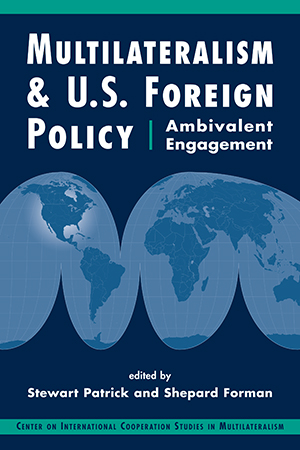
- 2001/500 pages
- Center on International Cooperation Studies in Multilateralism
Multilateralism and U.S. Foreign Policy:
Ambivalent Engagement
Hardcover: $62.00
ISBN: 978-1-58826-042-0
Paperback: $30.00
ISBN: 978-1-58826-018-5
When should the United States cooperate with others in confronting global problems? Why is the U.S. often ambivalent about multilateral cooperation? What are the costs of acting alone? These are some of the timely questions addressed in this examination of the role of multilateralism in U.S. foreign policy.
The authors isolate a number of factors that help to explain U.S. reluctance to commit to multilateral cooperation. They then analyze recent policy in specific areas—e.g., the use of force, peacekeeping, arms control, human rights, the United Nations, sanctions, international trade, environmental protection—probing the causes and consequences of U.S. decisions to act alone or opt out of multilateral initiatives. A concluding chapter underscores the point that increasingly pressing transnational problems may require the U.S. to reform its policymaking structures and to reconsider longstanding assumptions about national sovereignty and freedom of action.





